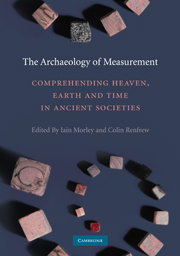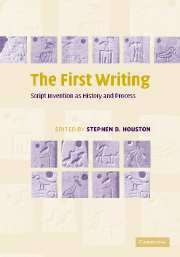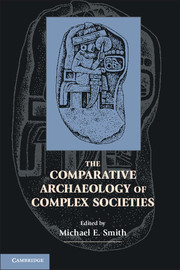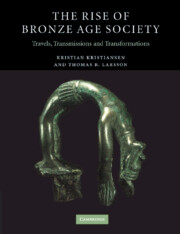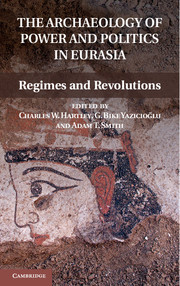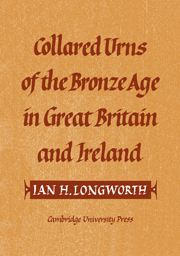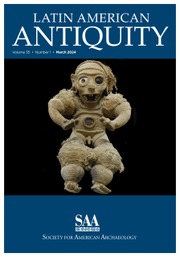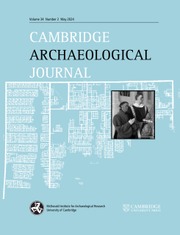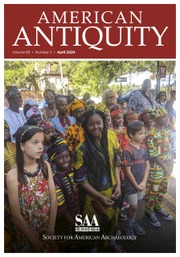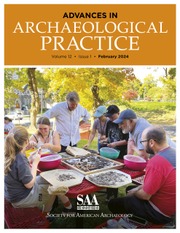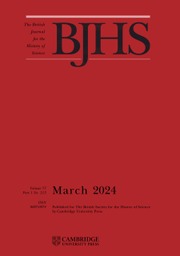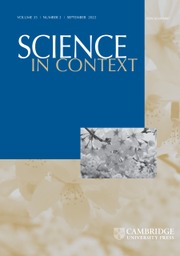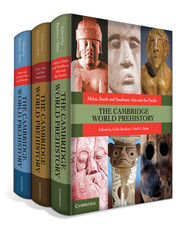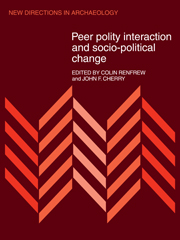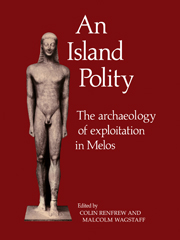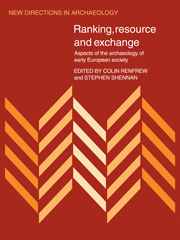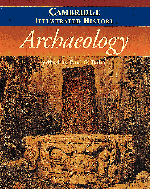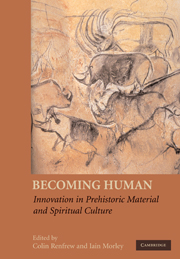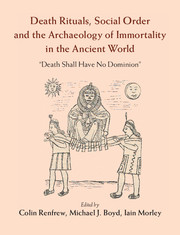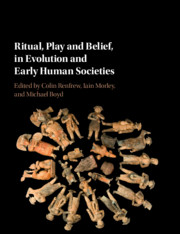The Archaeology of Measurement
Comprehending Heaven, Earth and Time in Ancient Societies
- Editors:
- Iain Morley, The MacDonald Institute for Archaeological Research
- Colin Renfrew, The MacDonald Institute for Archaeological Research
- Date Published: April 2010
- availability: Available
- format: Paperback
- isbn: 9780521135887
Paperback
Other available formats:
Hardback
Looking for an inspection copy?
Please email [email protected] to enquire about an inspection copy of this book
-
The construction of formal measurement systems underlies the development of science, technology, economy and new ways of understanding and explaining the world. Human societies have developed such systems in different ways, in different places and at different times, and recent archaeological investigations highlight the importance of these activities for fundamental aspects of human life. Measurement systems have provided the structure for addressing key concerns of cosmological belief systems, as well as the means for articulating relationships between the human form, human action, and the world. The Archaeology of Measurement explores the archaeological evidence for the development of measuring activities in numerous ancient societies, as well as the implications of these discoveries for an understanding of their worlds and beliefs. Featuring contributions from a cast of internationally renowned scholars, it analyses the relationships between measurement, economy, architecture, symbolism, time, cosmology, ritual, and religion among prehistoric and early historic societies.
Read more- Explores the archaeological evidence for the development of measuring activities in numerous ancient societies and the implications of these discoveries
- Featuring contributions from a cast of internationally renowned scholars
- Analyses the relationships between measurement, economy, architecture, symbolism, time, cosmology, ritual, and religion among prehistoric and early historic societies
Customer reviews
17th Oct 2024 by UName-861937
This book discusses the origin of human writing and the development of Western writing. It is very well written.
Review was not posted due to profanity
×Product details
- Date Published: April 2010
- format: Paperback
- isbn: 9780521135887
- length: 296 pages
- dimensions: 280 x 215 x 13 mm
- weight: 0.78kg
- contains: 130 b/w illus. 17 maps 19 tables
- availability: Available
Table of Contents
Introduction Colin Renfrew and Iain Morley
Part I. Number: Counting, Mathematics, and Measure:
1. Conceptualising quantification before settlement: activities and issues underlying the conception and use of measurement Iain Morley
2. Measurement in navigation: conceiving distance and time in the Neolithic Helen Farr
3. The token system of the ancient Near East: its role in counting, writing, the economy and cognition Denise Schmandt-Besserat
4. Grasping the concept of number: how did the sapient mind move beyond approximation? Lambros Malafouris
5. Numerical cognition and the development of 'zero' in Mesoamerica John Justeson
6. Recording measure(ment)s in the Inka Khipu Gary Urton
Part II. Materialising the Economy:
7. Measuring by weight in the late Bronze Age Aegean: the people behind the measuring tools Anna Michailidou
8. The concept of weighing during the Bronze Age in the Aegean, the Near East and Europe Lorenz Rahmstorf
9. Measuring the Harappan world: insights into the Indus order and cosmology J. Mark Kenoyer
Part III. Dimensions and Belief:
10. Architectural measurements in the Indus cities: the case study of Mohenjo-Daro Michael Jansen
11. Teothuacan City layout as a cosmogram: preliminary results of the 2007 measurement unit study Saburu Sugiyama
12. Aztec dimensions of holiness John Clark
13. Establishing direction in early Egyptian burials and monumental architecture: measurement and the spatial link with the 'other' Kate Spence
Part IV. Calendar and Cosmology:
14. The measurement of time and distance in the heavens above Mesopotamia, with brief reference made to other ancient astral sciences David Brown
15. Evolution of the calendar in Shang China Mark Lewis
16. The measure of time in Meso-America: from Teotihuacan to the Maya Anthony Aveni
17. Measuring time, sacred space, and social place in the Inca Empire Charles Stanish
18. Measuring time in the European Neolithic? The function and meaning of Central European circular enclosures Peter Biehl
Part V. The Spirituality of Measure:
19. The roots of spirituality and the limits of human mensuration F. LeRon Shults
20. Worldview, measurement and 'the roots of spirituality' Jeremy Begbie.Instructors have used or reviewed this title for the following courses
- Archaeological Lab Methods
- Cultural Astronomy
- Fallen Temples & Forgotten Gods: Cultural Geography of Ancient Religions
Sorry, this resource is locked
Please register or sign in to request access. If you are having problems accessing these resources please email [email protected]
Register Sign in» Proceed
You are now leaving the Cambridge University Press website. Your eBook purchase and download will be completed by our partner www.ebooks.com. Please see the permission section of the www.ebooks.com catalogue page for details of the print & copy limits on our eBooks.
Continue ×Are you sure you want to delete your account?
This cannot be undone.
Thank you for your feedback which will help us improve our service.
If you requested a response, we will make sure to get back to you shortly.
×
